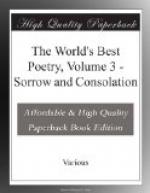Upon the last and sharpest height,
Before the spirits fade away,
Some landing-place to clasp and say,
“Farewell! We lose ourselves in light.”
SPIRITUAL COMPANIONSHIP.
XCIII.
How pure at heart and sound in head,
With what divine affections bold,
Should be the man whose thought would
hold
An hour’s communion with the dead.
In vain shalt thou, or any, call
The spirits from their golden day,
Except, like them, thou too canst say,
My spirit is at peace with all.
They haunt the silence of the breast,
Imaginations calm and fair,
The memory like a cloudless air,
The conscience as a sea at rest:
But when the heart is full of din,
And doubt beside the portal waits,
They can but listen at the gates,
And hear the household jar within.
L.
Do we indeed desire the dead
Should still be near us at our side?
Is there no baseness we would hide?
No inner vileness that we dread?
Shall he for whose applause I strove,
I had such reverence for his blame,
See with clear eye some hidden shame,
And I be lessened in his love?
I wrong the grave with fears untrue:
Shall love be blamed for want of faith?
There must be wisdom with great Death:
The dead shall look me through and through.
Be near us when we climb or fall:
Ye watch, like God, the rolling hours
With larger other eyes than ours,
To make allowance for us all.
DEATH IN LIFE’S PRIME.
LXXII.
So many worlds, so much to do,
So little done, such things to be,
How know I what had need of thee?
For thou wert strong as thou wert true.
The fame is quenched that I foresaw,
The head hath missed an earthly wreath:
I curse not nature, no, nor death;
For nothing is that errs from law.
We pass; the path that each man trod
Is dim, or will be dim, with weeds:
What fame is left for human deeds
In endless age? It rests with God.
O hollow wraith of dying fame,
Fade wholly, while the soul exults,
And self-enfolds the large results
Of force that would have forged a name.
THE POET’S TRIBUTE.
LXXVI.
What hope is here for modern rhyme
To him who turns a musing eye
On songs, and deeds, and lives, that lie
Foreshortened in the tract of time?
These mortal lullabies of pain
May bind a book, may line a box,
May serve to curl a maiden’s locks:
Or when a thousand moons shall wane
A man upon a stall may find,
And, passing, turn the page that tells.
A grief, then changed to something else,
Sung by a long-forgotten mind.




